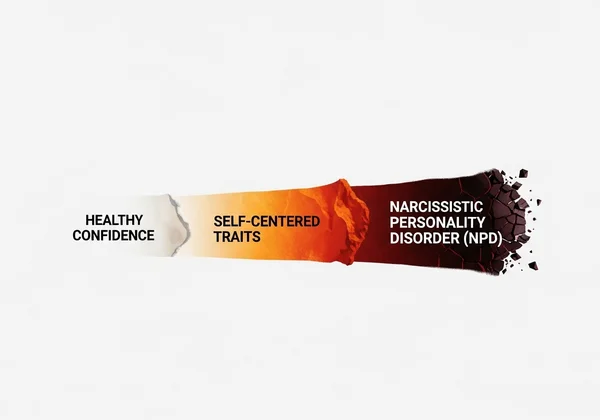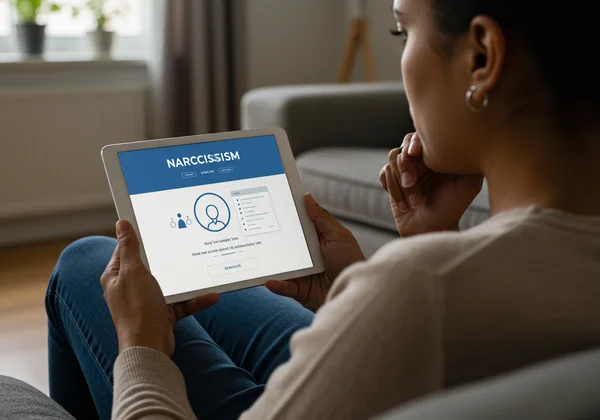Narcissism Test: Understanding the Spectrum of Healthy Confidence and NPD Traits
Ever looked in the mirror and wondered if your strong self-belief is healthy confidence or something more? Or perhaps you're trying to understand the confusing behavior of a friend, partner, or family member. It's a common question that leads many down a rabbit hole of confusion: How can I tell if I'm a narcissist? The reality is that narcissism isn't a simple "yes or no" label. It exists on a vast spectrum, ranging from admirable self-assurance to the challenging traits of a personality disorder.
This article will guide you through the nuances of this spectrum. We'll explore the fine line between healthy self-esteem and problematic self-centeredness, clarify what Narcissistic Personality Disorder (NPD) truly entails, and help you understand how a narcissism test can be a powerful first step toward greater self-awareness. To begin exploring your own traits, you can take our free test today.
Understanding the Narcissism Spectrum: Beyond Simple Labels
Thinking of narcissism as an on/off switch is one of the biggest mistakes we can make. Instead, picture it as a continuum. On one end, you have healthy, adaptive narcissistic traits that fuel ambition and resilience. On the other, you find the rigid and impairing patterns of Narcissistic Personality Disorder (NPD). Most of us fall somewhere in between, exhibiting some traits more than others depending on the situation. Understanding this spectrum is key to moving beyond harsh labels and toward genuine insight.

Healthy Confidence vs. Self-Centered Traits: Finding the Balance
At its core, healthy narcissism is about having a stable sense of self-worth. It allows you to accept compliments gracefully, pursue your goals with determination, and bounce back from setbacks. Someone with healthy confidence can advocate for their needs while still respecting the needs and feelings of others. They possess empathy and can celebrate others' successes without feeling threatened.
Self-centered traits begin to emerge when this balance tips. While not a disorder, a person leaning this way may frequently steer conversations back to themselves, show a lack of genuine interest in others' problems, and have a subtle sense of entitlement. They might struggle with criticism and feel their contributions are consistently undervalued. This is often where the "am I a narcissist test" query comes from—a place of questioning whether these common human flaws are pointing to something more significant.

Common Misconceptions About Narcissism: What It Is, and Isn't
Let's tackle some common myths about narcissism. Being confident, ambitious, or proud of your achievements does not automatically make you a narcissist. Taking a selfie or enjoying the spotlight isn't a red flag on its own. Narcissism becomes problematic when the need for admiration becomes insatiable, when empathy is consistently absent, and when relationships are used primarily for personal gain. It's the difference between saying "I'm good at this" and believing "I'm better than everyone else, and they exist to serve my needs."
When Traits Become a Disorder: The Reality of NPD
At the far end of the spectrum lies Narcissistic Personality Disorder (NPD), a formal clinical diagnosis. It's important to understand the distinction between having narcissistic traits—which many people do—and meeting the criteria for NPD, which is far less common. This section is for educational purposes only and is not intended to diagnose. Only a qualified mental health professional can provide a diagnosis.
Key Characteristics and Diagnostic Criteria of Narcissistic Personality Disorder
NPD is defined by a pervasive pattern of grandiosity, a constant need for admiration, and a profound lack of empathy. According to diagnostic manuals like the DSM-5, an individual must show a significant number of specific traits that impair their functioning. These include:
-
A grandiose sense of self-importance (e.g., exaggerating achievements and talents).
-
Preoccupation with fantasies of unlimited success, power, brilliance, or beauty.
-
A belief that they are "special" and unique and can only be understood by other special people.
-
A requirement for excessive admiration.
-
A strong sense of entitlement and an expectation of favorable treatment.
-
A tendency to be interpersonally exploitative, using others to achieve their own ends.
-
An inability or unwillingness to recognize the feelings and needs of others.
-
Being envious of others or believing that others are envious of them.
-
Showing arrogant, haughty behaviors or attitudes.

The Impact of NPD on Daily Life and Relationships
Living with or having a relationship with someone with NPD can be incredibly challenging. Their inability to form empathetic connections often leads to volatile, shallow, and transactional relationships. In the workplace, they may be charismatic at first but can create toxic environments through manipulation and a disregard for colleagues' contributions. For the individual with NPD, life can feel empty and unsatisfying, as their self-esteem is incredibly fragile and dependent on constant external validation.
Your Narcissism Test Results in Context: Interpreting the Spectrum
This is where an online tool can offer valuable perspective. By answering questions about your typical thoughts, feelings, and behaviors, a narcissism test can provide a snapshot of where you might fall on this continuum. It’s a starting point for reflection, not a final verdict. If you're ready to see where you land, you can start your free test on our homepage.
What Your Score Implies: Traits, Tendencies, Not a Diagnosis
Receiving your results is a moment for curiosity, not panic. A higher score does not mean you "have" NPD. It simply indicates that you may exhibit more narcissistic traits than the average person. Think of it as a guide pointing out potential blind spots. Perhaps your score highlights a tendency toward entitlement or difficulty handling criticism. This is not a judgment but an opportunity. It is crucial to remember that this tool provides informational insights and is not a substitute for a professional clinical diagnosis.
Leveraging Self-Awareness for Personal Growth and Healthier Relationships
The true value of any personality assessment lies in what you do with the information. Understanding your tendencies is the first step toward personal growth. If you recognize that you struggle with empathy, you can consciously practice active listening. If you see a pattern of entitlement, you can work on expressing gratitude and acknowledging the contributions of others. This journey of self-awareness can lead to more fulfilling connections and a stronger, more authentic sense of self. Gaining this initial insight can be the catalyst for meaningful change, and our test can help you gain clarity now.

Navigating Your Self-Awareness Journey on the Narcissism Spectrum
Embracing the spectrum of narcissism can transform how you view yourself and others, turning a once-daunting label into a powerful tool for insight. Remember, recognizing your place on this continuum isn't about shame; it's about finding empowerment in deeper self-understanding.
By embracing self-exploration, you can better navigate your relationships, understand your motivations, and build a more authentic life. The journey starts with a single, honest question. Ready to take that first step towards greater self-awareness? We invite you to take our free, confidential narcissism test and begin your journey.
Frequently Asked Questions About the Narcissism Spectrum
Is there a definitive test to know if I'm a narcissist?
No online test can definitively diagnose you with Narcissistic Personality Disorder (NPD). Our test, like others, is a self-assessment tool designed to measure narcissistic traits and tendencies, helping you understand where you might fall on the spectrum. A formal diagnosis can only be made by a qualified mental health professional after a comprehensive evaluation.
Can high self-esteem be mistaken for narcissism?
Yes, this is a common point of confusion. The key difference is empathy and the source of self-worth. High self-esteem is rooted in an authentic appreciation of one's own value and capabilities, and it coexists with respect for others. Problematic narcissism, however, involves a fragile self-worth that relies on feeling superior to others and requires constant external validation.
Do people with narcissistic traits know they have them?
It varies greatly. Some individuals may have a degree of awareness, especially if their behaviors lead to negative consequences like failed relationships or job loss. However, a core feature of strong narcissism is a lack of insight. Defense mechanisms like denial and blame are often used to protect their fragile ego, making it difficult for them to see their own role in conflicts. An objective tool can sometimes help provide a new perspective to explore these traits.
What's the core difference between narcissistic traits and NPD?
The primary difference lies in severity, pervasiveness, and impairment. Many people have some narcissistic traits that show up occasionally. For a diagnosis of NPD, these traits must be inflexible, long-standing, and cause significant distress or impairment in major areas of life, such as work, family, and social relationships. It's the difference between having a self-centered moment and living in a self-centered world.